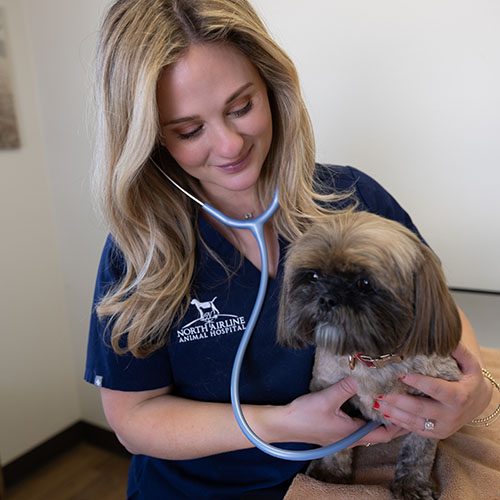Senior Pet Care
Did you know that pets age faster than people and can be considered "seniors" at around 7 years of age? Just as our health care needs change as we age, your pet's health care needs also change. Nutritional needs, exercise habits, and many aspects of your pet's daily routine can change as your pet ages. But how can you tell the difference between "normal" aging and a medical problem? As in humans, some health issues that affect older pets can begin with very subtle changes that may go unnoticed until the problem has become serious.
Regular wellness visits are important for every stage of your pet's life, so don't forget to keep your senior pet's scheduled wellness appointments. The best way to help protect your pet as he or she ages is to understand the aging process in pets. We understand that process and can help you help your pet. Even if your senior pet is already being treated for a medical condition, treatment recommendations can change as a condition progresses.

Sometimes medication dosages need to be adjusted, or medication may need to be changed. Routine wellness blood work and other routine diagnostic testing are important for senior pets because these tests allow us to evaluate how your pet's health is either responding to current management strategies or changing with age.
We offer Wellness Plans for your dog or cat at low monthly payments!
Book your senior dog or cat's appointment today!
Why is it necessary to get an older dog or cat to a veterinarian?
Getting an older dog or cat to a veterinarian is essential for maintaining their health and quality of life. As pets age, they become more susceptible to a range of conditions, including arthritis, dental disease, kidney issues, and heart disease. Regular veterinary check-ups can help detect these conditions early, allowing for prompt treatment that can manage symptoms, slow disease progression, and improve your pet’s comfort.
Veterinarians can also adjust vaccination schedules for senior pets, as well as provide parasite prevention tailored to their needs. Regular exams allow vets to monitor weight, mobility, and overall vitality, ensuring that any changes in behavior or health are addressed quickly.
In addition, senior pets often experience subtle signs of discomfort or illness that may be hard for owners to notice. Veterinary visits provide an opportunity to discuss changes in appetite, activity levels, or behavior, giving a clearer picture of your pet's health. Early intervention can prevent conditions from becoming more severe or harder to treat.
Ultimately, veterinary care for senior pets is about providing the best possible care for their aging bodies, ensuring they remain comfortable, active, and happy. With proper monitoring and treatment, older pets can lead fulfilling lives well into their senior years.



